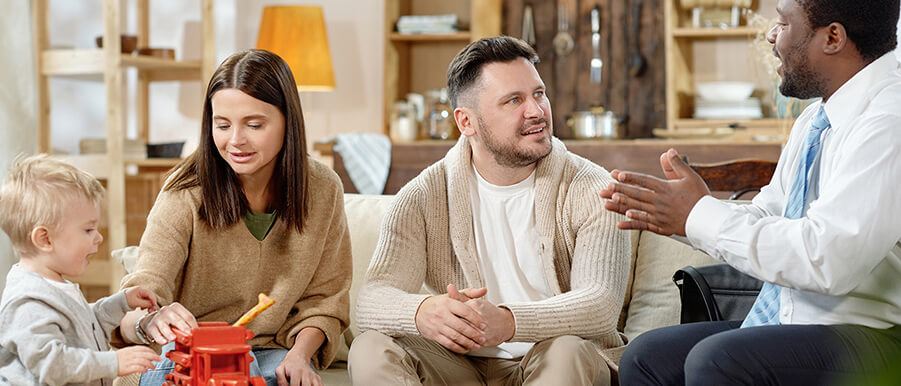 17 Jul 2020
17 Jul 2020
BY: admin
Relationships
How to Talk to Your Children About Racism
How to Talk to Your Children About Racism
After the murder of George Floyd and the 2020 Black Lives Matter protests, all of us have reevaluated our own beliefs and become more aware of how deeply racism still impacts people today. Society is changing, and for many, America feels unstable and, as a result, unsafe.
Parents want nothing more than to give their children a peaceful, prosperous upbringing, but that feels difficult now with social justice and political conversations entering every sphere of life.
Talking to your children about racism is important for several reasons; for small children, it helps combat the development of implicit biases many of us grew up with and had to unlearn. For older children, it gives them a safe environment to ask questions, explore their thoughts and be guided toward an educated worldview.
It’s okay not to have all the answers, but that is not a reason to avoid the topic. By addressing racism at home, you can help your children feel understood, be more inclusive and grow up to be people who are able to stand up for equality and combat racial injustice.
When does racism begin?
Babies become aware of physical differences such as skin color as early as 6 months old. By age 5, children begin to show early signs of racial bias and preferences. This can evolve through a number of ways, including subconscious social conditioning in schools and predominant exposure to only one particular race in the media.
Children are far more aware of racism than parents think; it’s a part of society that they are exposed to at an early age. The goal for parents today should be to teach their kids how to combat racism by modeling and promoting inclusivity and celebrating diversity.
Children Under 5
For preschoolers and kindergarteners, it’s important to adapt to their emerging tendency of noticing differences. As they get older and more vocal, toddlers and young children are likely to ask questions or make observations. The old traditional response to this natural curiosity was to chastise or shush children whenever they pointed out a racial difference.
Although parents likely thought this was disapproving of the behavior, it actually creates a negative connotation with racial openness and curiosity. Rather than seeing diversity as something interesting, children receive the message that it is taboo and different equals bad.
You can create a more inclusive environment at home by introducing your child to more diverse toys and media. For example, buy a White, Black and brown baby doll for them to play with. Watch movies and read children’s books that feature Black, Asian and Hispanic main characters. When they ask questions, provide answers and listen to their thoughts. Focus on fairness and sending the message that we are all wonderful and equal no matter what we look like.
Elementary and Middleschoolers
Children in this age group are likely already familiar with the concept of racism. They may already have heard about it from peers, seen it on news or read headlines online. The internet can be a valuable tool, but it can also expose children to biased, sensitive and even graphic material that they are not yet ready to confront. Rather than being able to analyze and decide whether it’s valuable to them, children tend to perceive everything they read online as fact.
Use the web together to explore various media that discuss racism at an appropriate level. BrainPop is an educational platform that offers free resources to promote an antiracist education. Materials are divided by age and cover both historical events and figures such as Harriet Tubman, Jim Crow, Martin Luther King Jr., slavery and the Black Lives Matter movement.
Teens
Teenagers today are impassioned and politically aligned far earlier than their parents and grandparents were. Talk to them about their views, listen to their concerns and find ways to help them be a safe and peaceful activist. You should also tap into their emotions and ask them how they’ve been handling these events and the feelings they stir up. Anxiety, depression, frustration and fear are all normal and natural responses, but they need to be addressed with care.
Educate Yourself First
You may not even know how to start talking about racism because you have your own questions. The subject is so emotionally charged today that many people want to avoid it altogether. There is no perfect answer or cut-and-dry solution for discussing racism at home, but the best conversations come from a position of education and intellectual curiosity.
Start by reading up on the history of racism yourself. Read material by Black and other minority authors. And address your own stress, frustration and anxiety about the state of the world with people you trust. For some, the best source is a licensed therapist who knows how to guide conversations about difficult or challenging topics.
If you would like personal tips on how to talk to your children about racism, or if you need a safe space to confront your own struggles and concerns, we’re here for you. Contact Caring Heart Counseling today by clicking the button below.
 15 Jul 2020
15 Jul 2020
BY: admin
Relationships
Five Fun Family Road Trips from Denver
Five Fun Family Road Trips from Denver
Although the coronavirus has changed the way we travel and enjoy vacations, there are still adventures your family can have that keep everyone safe. To reduce the spread of COVID-19, it’s best to avoid any crowded areas with heavy foot traffic such as hotels and theme parks, even those that are open to the public. Instead, take in some of the gorgeous sights Colorado has to offer by planning a family road trip to some of these breathtaking locations a short drive from Denver.
Yellowstone National Park
The trip from Denver to Yellowstone is approximately 10 hours, making it the longest road trip on this list. If your family has a camper or RV, this is a great time to use it. The kids can unwind, play games and have fun during the ride while you take turns driving and enjoying the scenery unfold around you.
The fastest route to Yellowstone from Denver is via Interstate 25 and Interstate 80. On this trip, you’ll move through the picturesque Rockies and roaming landscapes teeming with nature and wildlife.
Great Sand Dunes National Park
Around 250 south of Denver lies America’s tallest sand dunes. You’ll feel like you’ve been transported to an exotic, faraway land as you gaze upon the dunes. Take a family hike or even go sand sledding; this is an excellent spot to practice safe summer social distancing while still getting to experience something new away from home.
You can cut through Colorado Springs on your journey, which lasts around four hours. If you head out early, this is a great one-day road trip that will have the kids excited all morning and sleeping on the way home.
Rocky Mountains
The Rocky Mountains are one of Colorado’s most beloved natural monuments with numerous hiking trails, scenic routes and wildlife. The Trail Ridge Road is a 48-mile highway that stretches through the mountains and peaks at 12,183 feet. A designated All-American Road, Trail Ridge offers your family ample opportunity to stop and pause to appreciate the view.
The Rocky Mountain National Park driving experience takes your family on an incredible journey surrounded by incredible landscapes and diverse ecosystems.
Glenwood Springs
Driving from Denver to Glenwood Springs will take you through Keystone, Copper Mountain and past the Arapaho and Roosevelt National Forests. The trip spans around two and a half hours, making it ideal for those who enjoy scenic trips but not long car rides. Families with babies or small children will especially benefit from this rewarding but comfortable road trip.
Once you reach Glenwood Springs, you can visit the famous Hanging Lake, which is currently open with social distancing restrictions. The family may simply enjoy taking the trip, singing their favorite songs and basking in the landscapes around them.
Santa Fe
A road trip from Colorado to New Mexico makes an excellent weekend getaway. The adventure features plenty of scenery, wildlife and beautiful canyons that illustrate the diversity of both states. The distance from Denver to Santa Ve is around six hours and features plenty of small towns, museums and historical sights in between.
When planning your family road trips, make sure that you plot an itinerary and check the current restrictions for every destination. Getting out in the sunshine is important even during the coronavirus, and road trips offer a safe way to travel that puts nature right in front of you.
 06 Jul 2020
06 Jul 2020
BY: admin
Counseling
Online Counseling for the LGBTQ+ Community
Online Counseling for the LGBTQ+ Community
The LGBTQ+ community experiences mental health problems more frequently than other populations. Anxiety, depression, body dysmorphia and many other symptoms are common, but there is a fear among people who need counseling that their therapist may not understand their experiences or approve of their identity. Online counseling during COVID-19 has made finding professional support easier and more convenient than ever; at Caring Heart Counseling, we offer virtual therapy to everyone, including affirming LGBTQ+ care.
What LGBTQ+ Therapy Looks Like
A therapist must understand that everyone’s culture, background and individualized experiences make their mental health unique. No two people experience depression the same, and it’s especially important for us to recognize the unique factors that impact an LGBTQ+ person’s mental well-being.
There is often what is known as a “dual stigma” among people in the LGBTQ+ community. In addition to being judged for their sexuality and/or gender identity, people also face the fear of ridicule for their mental health struggles. There are numerous challenges and emotionally charged experiences that arise as a LGBTQ+ person comes out to their family and learns to own their identity; online counseling can help you build a support system and begin to find strength as you work through your own difficulties.
Caring Heart Counseling does not see your LGBTQ+ experience as something to gloss over; we want to help you work through your thoughts and emotions surrounding your sexuality, gender and identity. Whether you are questioning or unsure how to accept yourself despite identifying as LGBTQ+, we are here to listen and support you.
Affirming, Non-Judgemental Counseling
Therapy is a safe space for everyone to share their thoughts and feelings. It can be especially intimidating for an LGBTQ+ person to reach out because they worry their therapist may not accept them for who they are. This is a valid concern, but we can assure you that every therapist at Caring Heart Counseling accepts, respects and affirms your identity.
It is our job to help you not only work through your unique LGBTQ+ experiences but also cultivate a life you find meaningful. This means finding ways to align your truest self with your highest potential, embracing your strengths, overcoming weaknesses and learning how to take power back from your worst experiences.
Whether you struggle with depression, anxiety, body image or just need someone to talk to, we are here to listen. Online therapy means you can access one of our counselors whenever you need them; we can arrange a phone call or set up an appointment via email. Our flexible hours and a variety of platforms make it easy for you to schedule counseling at a time that is most convenient and comfortable for you.
If you would like to learn more, please reach out and contact us today. We are more than happy to answer any questions you have about therapy and our LGBTQ+ counseling services. Together, we can determine whether Caring Heart is right for you and match you with the counselor best suited to your personality and needs.
 01 Jul 2020
01 Jul 2020
BY: admin
Counseling
Can Racial Trauma Cause PTSD?
Can Racial Trauma Cause PTSD?
Following the murder of George Floyd, America has been forced to address a long-standing history of racial injustice and discrimination. Many people have only just begun to listen, but the Black community has been speaking up for years. Now, they have a greater voice than ever, but with that attention comes an incredible amount of pressure. Emotional trauma from racial discrimination is finally being acknowledged, but where do you go to start healing?
Being Black in America is a stressful, anxiety-ridden experience on my fronts; parents fear for their children’s lives every day, and individuals experience shaming, ridicule and discrimination throughout life. Racial-based trauma can lead to a variety of mental health symptoms and conditions including depression, anxiety and post-traumatic stress disorder (PTSD).
What is Racial Trauma?
Black and POCI people have faced systemic injustices for centuries; cultural conditioning has resulted in hundreds of microaggressions that lead to chronic stress and anxiety. From fear of being pulled over and arrested unjustly or facing workplace discrimination or harassment, Black people have always been forced to live differently.
For LBGTQ+ and transgender Black people, the rate of discrimination and targeted attacks is even worse. In virtually every aspect of their life, ethnicity plays a factor in how they are treated, perceived and ultimately valued.
The result of this ongoing trauma includes physical and psychological effects, many of which share symptoms with PTSD. Hypervigilance, avoidance, anxiety attacks, flashbacks and nightmares are all common experiences that have been silenced for far too long.
At Caring Heart Counseling, we are committed to helping members of the Black community heal and grow from their experiences; we strive to use our own skills and platform as a voice for the underserved, and we want to not only help you overcome racial trauma but transform your pain into a powerful testament to the BLM movement.
How We Treat Racial Trauma
Social and cultural context are two of the most important aspects of addressing racial trauma. Even if you do not meet the diagnostic criteria for PTSD, your experiences are real, valid and deserve to be acknowledged for exactly what they are. We are here for you, and we want to help you find strength in your story.
Education is the cornerstone of our own treatment; we know that we have to learn and continue to amplify Black voices to become more understanding and empathetic therapists. Our entire team is committed to continually providing expert therapy and counseling to members of the Black community.
Together, we can work through this historic movement while resolving pain from the past and building hope for the future. Together, we will stand with you now and in the future with unlimited support, compassion and guidance.
 05 Jun 2020
05 Jun 2020
BY: admin
Virtual Counseling
Divorce Counseling During COVID 19
Divorce Counseling During COVID 19
Divorce is often one of the most emotionally challenging experiences in a person’s life; coupled with the stress of Divorce is often one of the most emotionally challenging experiences in a person’s life; coupled with the stress of the coronavirus, coping with separation and the end of a marriage can be even more difficult. To end your relationship as peacefully as possible and gain the closure you need to move forward, you may consider online divorce counseling.
Why You Need Divorce Counseling
Whether your decision to separate was mutual or one-sided, the purpose of divorce counseling is to arrive at a place of mutual respect and understanding. Both partners in the relationship deserve a chance to share their experiences and leave their marriage with a sense of closure.
You can also choose to seek divorce counseling alone. While it can be helpful to have both spouses present, your decision to seek therapy is personal and can still be meaningful by yourself.
Divorce counseling can also help you honor your marriage and the love you once shared. You will be able to work through the loss, voice unspoken pain wounds and begin to heal. It is a place to cultivate acceptance and ultimately, peace.
Handling Emotions During COVID-19
Divorce during the coronavirus can also be accompanied by feelings of guilt; compared to those who are ill or grieving the loss of a loved one, you may feel like you are selfish for being so upset by your marriage ending. Divorce is hard, and the current pandemic doesn’t make it any less real or painful. In fact, it could make it even more difficult to cope with.
The time spent alone in quarantine can also increase feelings of loneliness and isolation; you may find yourself looking up your ex on social media, wanting to reach out to them or even attempting to rekindle the relationship despite your decision to separate. When you share friends and loved ones, it can be especially difficult to find the type of support you need.
Although the coronavirus has put many things into perspective, it does not mean we have to completely ignore our problems and repress our feelings. Right now, you hurt, and that is okay. Online counseling is one way you can reach out and find the connection and support you need to cope with this experience. Therapy can help you establish a new routine, close old chapters and start planning for the next stage of your life.
Please click here to learn more about our virtual counseling services. You can request an appointment with one of our therapists on this page.
 26 May 2020
26 May 2020
BY: admin
Virtual Counseling
Family Counseling During COVID-19
Family Counseling During COVID-19
The coronavirus presents challenges not only to your personal mental health but the entire family. You or a partner may have lost your job; the stress of parenting during a pandemic coupled with health anxiety and financial troubles can cause us to withdraw, become emotionally detached and even argue with our loved ones far more than usual.
Social distancing means neither children nor parents have the opportunity to spend time with their friends. Without an outside support system, life can feel intensely confining. Everyone needs a healthy dose of personal space and independence, even children. Striking this balance amid stay-at-home orders may seem impossible, but with the right help, it can be done.
Whatever troubles you may face, our online family counseling services can help you resolve problems peacefully. We help the entire family learn how to communicate better, support one another and fulfill their unique role in the household.
Parenting During the Coronavirus
Most parents are accustomed to having their children in school during the day while they work. Now, you find yourself responsible for not only your child’s well-being but also their education. Although many schools provide daily virtual instruction, it can be difficult to establish reasonable boundaries and appropriate discipline.
Therapy can help parents learn how to address troublesome behaviors without losing their temper or damaging their relationships with their children; family counseling also provides children with an opportunity to share their thoughts and express feelings they may struggle to communicate on their own. This fosters a deeper sense of trust and understanding throughout the family.
Self-Care and Relationships
For couples who are quarantined together, finding time to care for themselves and nourish their relationship can be extremely challenging. On top of work, parenting and stress, quality time as partners may fall to the backburner. However, it is important to learn how to work together so challenges bring you closer together, not further apart.
Counseling offers a space to release feelings you have been holding onto without escalating into an argument. Therapists help couples learn how to focus on solutions, not problems. By sharing responsibilities, respecting each other’s need for self-care and scheduling time to be together, you can restore balance to your family and relationship.
Transition Anxiety
Children who struggle to transition from school to being at home constantly are likely to express their frustration or worry through misbehavior. Your once mild-mannered child could suddenly become argumentative and defiant; children with ADHD or autism spectrum disorder are particularly sensitive to change, so finding ways to help them adjust and regain a sense of balance is crucial.
Through online family therapy, one of our licensed counselors can help you begin to understand change and anxiety through your children’s eyes. They can also offer tips for your own mental health so you are able to be fully present and emotionally engaged through the uncertainty of COVID-19.
Distance Learning Support
Virtual family counseling addresses everything from major changes to the family unit to everyday struggles. As parents and children face what is likely to be a prolonged period of distance education, it is important to make virtual schooling easy and fun.
Children who are resistant to learning on a computer may be more responsive to different approaches. Tailoring education to their unique learning style can reduce defiant behaviors, improve attitudes and even foster excitement toward learning new things each day.
To learn more about our services or schedule an appointment, please contact us.
 27 Apr 2020
27 Apr 2020
BY: admin
Relationships / Virtual Counseling
Relationship Counseling During COVID-19
Relationship Counseling During COVID-19
Quarantine and COVID-19 pose unique challenges to couples; some may be finding it difficult to maintain personal boundaries and healthy communication as they quarantine together while others are feeling detached and disconnected due to social isolation. Relationships are not exempt from the added stress of coping with the coronavirus, but partners do not have to simply hope for the best and ignore their problems.
Relationship counseling online can bridge the distance of social isolation and connect couples with licensed therapists who can help them work through any challenges they’re experiencing.
How Relationships Are Impacted by the Coronavirus
Dating requires consistency, communication and a healthy dose of independence on both sides. Couples currently find themselves either separated by mandatory shelter-in-place orders or confined together in their living quarters with limited outside social contacts.
For even the closest couples, quarantining together can be difficult. Constantly being around one another can lead to more arguing, and the flare-up of mental health symptoms many are experiencing may put further strain on a relationship.
Some partners may feel helpless as their significant other’s anxiety and/or depression symptoms worsen. Others might not be sure how to express their desire for personal space without being offensive. There may be limited opportunity to separate and cool off before resolving arguments. Others may feel like their relationship is stagnating without the ability to go out and do things together.
On the other end of the spectrum, COVID-19 has led to social isolation that has many couples separated. Those in long-distance relationships may feel especially distraught as they have no definitive date when they can see one another again.
The stress of managing a relationship and life during the coronavirus makes online counseling and relationship therapy a beneficial tool to anyone who finds themselves struggling during this time.
What Relationship Counseling Can Do Today
No therapist has all the answers, and couples might even feel like they’re at a loss for help with physical offices closed. But online counseling for couples can be just as effective as in-person sessions. Couples can speak together or individually to a counselor about what they’re going through and work on developing solutions.
Online counseling provides the opportunity for couples to express thoughts and feelings they may not be able to articulate with their partner during regular conversation. A counselor knows how to ask questions that facilitate constructive dialogue and foster understanding.
Together, couples and individual partners can work with a counselor to learn how to support each other through COVID-19 and protect their relationship. To speak with a therapist or request an appointment, click here.
 21 Apr 2020
21 Apr 2020
BY: admin
Counseling / Virtual Counseling
Telecounseling for Teens in Denver
Telecounseling for Teens in Denver
Life as a teenager is tough. As they are beginning to develop their own values and figure out their identities, teenagers face a tremendous deal of stress during the final years of childhood. Many are already making decisions that will impact their future for years to come, which naturally comes with a great deal of stress that can trigger anxiety and depression. Adolescence is also the onset period for many mental illnesses.
Adolescent counseling can provide support and guidance to teens even amidst social distancing and the coronavirus.
Common Reasons Teens Attend Counseling
Many adolescents feel like they’re being “forced” to go to therapy by their parents who “think something is wrong with me.” But therapy is not a place designed to fix anyone, because no one is broken. People all have their own unique struggles, but we believe that our experiences are just that. They do not define us no matter how much they may impact us.
Teens can benefit from counseling if they are struggling to stay motivated in school, experiencing conflict at home or going through a difficult time. Trauma, anxiety and depression are common mental health conditions that teenagers can overcome with the help of a licensed professional.
The earlier a teenager gets help for whatever they’re going through, the greater the chance of a long-lasting recovery. Far too many people stay trapped in the shadows of stigma, longing for help but too afraid to get it. Whether you are a concerned parent or a teenager yourself, there is no shame in getting help. Counseling, either in person or online, can provide the tools and support necessary to heal and grow.
Signs Your Teenager Needs Counseling
Every parent worries about their child, but how do you know when your problems warrant professional help? Generally, when an issue is beyond your scope of understanding or has begun to cause serious disruptions to your family life or teen’s ability to function, it’s a good idea to speak with a counselor.
Certain behaviors pose a significant threat to your teen’s well-being, and they may indicate underlying mental health issues. For example:
- Substance abuse
- Angry outbursts
- Criminal activity
- Avoiding friends and family/sudden change in friends
- Changes in sleeping and/or eating habits
- Isolated, withdrawn attitude
- Dramatic changes in personality and behavior
- Talking or thinking often about death/self-harm
The later teenage years also mark the onset of mental illnesses such as bipolar disorder and schizophrenia. Having an honest discussion with your teenager about any concerns you have can help them feel more comfortable opening up. Sometimes, teens just need to be reminded that people do care about them and want to listen.
Ways to Help a Struggling Teenager
You might often feel like your teenager is from an entirely different universe when they speak. Parents often wonder, “Was I like that to my parents?” when they begin to struggle to have even basic conversations with their adolescents. Teenagers are not speaking in code or generally going out of their way to be distant; they might be embarrassed or ashamed of what they’re feeling or even too afraid to confront it through a conversation.
Respect Boundaries
The best thing you can do as a parent is to be fully present without being overly persistent. The harder you push, the farther your teen will pull away. Offer to do activities with them that they enjoy. Even something as simple as eating dinner together or watching a movie can have an impact on a teen’s sense of support and security.
Don’t invade their privacy without any necessary reason to do so, but keep an eye on any concerning behaviors. You may want to check their social media accounts or internet history if you worry they might be engaging with harmful content or talking to strangers.
Keep Communication Focused on the Positive
Most importantly, let your child know that you love them and want to hear what they have to say. Teenagers often worry their parents will judge them, argue with them or even hate them for voicing their true feelings. Although you may not always like what you hear, you must respond to your teenager’s emotions with empathy and understanding. Use affirming statements during conversation such as, “That sounds really hard,” and “Thank you for sharing this with me.”
If you bring up the subject of therapy, let them know that getting professional help is a good thing, not a sign of failure or weakness. Ultimately, therapy is for your teenager to receive help and provide a safe space to disclose whatever they’re going through without fear of judgment. Therapy is a resource, not a punishment. It should never be leveraged as something needed to “fix” them or correct their behavior.
Telecounseling for Teens
We offer online therapy for teens with licensed counselors in the state of Colorado. Talking to a therapist online can be a good stepping stone for many teens, and it’s the best way to get support even during the coronavirus pandemic. To learn more about our services or to request an appointment, please click here.
 09 Apr 2020
09 Apr 2020
BY: admin
Counseling
How to Talk to Your Children About the Coronavirus
How to Talk to Your Children About the Coronavirus
Talking to children about certain subjects is always a challenge, but for most cases, we have time to plan and prepare. The new coronavirus has thrown everything for a loop, and many parents are left grappling with all the sudden changes. During this hectic and uncertain period, it can be easy to get so caught up in our own anxieties that we forget to include our children.
Talking to your children about the coronavirus can help ease their anxiety, reduce stress and learn how to protect their own health. We’ve put together a few suggestions on how you can teach your children about COVID-19.
Don’t Hide Reality
Although you should disclose details that are appropriate for your child’s age level, even toddlers can understand there has been a disruption to the norm, and it’s not wrong to talk to them about it. In fact, introducing children to the topic early can help them start to build resilience. This is an opportunity for your child to understand there are things in life beyond their control, but they can adapt with support rather than cope with anxiety.
Avoiding a scary subject like the virus can actually heighten children’s concerns. After all, if their parents aren’t talking about it, it must be really bad, right? They are bound to see headlines on the TV or phone, overhear adults talking about COVID-19 and draw their own conclusions.
Help dispel worry by talking openly about the virus. You can find the best information on the Centers for Disease Control and Prevention website. There is also a free video by education site BrainPop that you can watch together and discuss.
Stay on Their Level
Children should be spoken to in a manner that is easy for them to understand. Keeping language developmentally appropriate can help prevent misunderstandings and greater confusion. A small child between the ages of 2 and 4 will likely be fine with a straightforward, two-sentence explanation such as, “A lot of people outside are getting sick right now, so we’re going to stay inside to keep ourselves healthy while the doctors do their jobs.”
Older children will likely prompt for greater detail; those who use the internet have likely come across articles and done some of their own reading already. Answer their questions as they come, but keep a positive mindset. Focus more on what you and your family can do, like self-isolating and washing your hands regularly. Anxiety stems from uncertainty and feelings of powerlessness; shifting your child’s attention to their ability to protect themselves and others will help alleviate discomfort.
Reassure Repeatedly
Let your child know that the coronavirus seems to affect children in less severe ways, and that if they practice good hygiene, they will most likely not catch it. Remind children that they have the ability to protect themselves and their family; talk about the right way to wash your hands, which is 20 seconds. A helpful way to remember is to sing the “Happy Birthday” song while they lather with soap and water.
Stick to a Routine
It can be helpful for both you and your children to follow your usual schedule as closely as possible; it should be business as usual when it comes to waking up, bedtime and getting dressed. Maintaining this semblance of normalcy will bring comfort and security to children as they adapt to the many changes going on around them.
Enjoy Family Time
While sticking with a routine, let you kids know that this is also a great opportunity to have some extra family time and to do some things that you typically wouldn’t be of a mind to do or wouldn’t feel like you had the time for. Create an extra movie/pizza night, game night, book night, or outdoor games challenge. Do some Go Noodle dances together. Sing karaoke! Have a Dude Perfect shot or bottle-flipping challenge. One family we know of created a tik tok dance together. There are so many ways to take advantage of this time.
A good combination of all the above will make this an easier time for your children, you as parents, and for all of you as a family.
At Caring Heart Counseling, we want to be here for you and your family during this challenging time. We offer virtual counseling with our therapists that you can access right from the comfort of your own home. To learn more, contact us today.
 06 Apr 2020
06 Apr 2020
BY: admin
Counseling
10 Tips for Working from Home During COVID-19
10 Tips for Working from Home During COVID-19
Millions of Americans are working home to help curb the outbreak of the coronavirus, but remote work takes some getting used to. For many of us, work is strictly at an office, so the distinction between work and play was as simple as coming home. Now that you’ll be spending most of your time indoors, it’s important to set yourself up for productivity to avoid burnout, overworking or too much procrastinating.
These 10 tips will help you adjust to working from home during COVID-19.
Get Dressed Everyday
Although it’s tempting to just wear your pajamas all day, getting dressed is one of the easiest ways to get yourself into “work mode.” The act of dressing yourself for work can help create a psychological division between relaxation and productivity.
Have Routine Breaks
It can be easy to slip into work at your desk or dining room table and completely lose track of time. Avoid this by taking your lunch break at the same time you normally do and getting up for at least 10 minutes every hour to stretch your legs.
Talk to Your Coworkers as Usual
You’ll need to communicate with your colleagues even more now that you aren’t physically able to check in with one another. Use Zoom, Slack and any other programs your company prefers as often as possible.
Turn Your Phone on Silent
Unless you need it on for work, ditch your cell phone during work hours. If you keep it by your desk, you’ll likely find yourself picking it up to scroll through Instagram or respond to text messages more often than you could at the office.
Avoid Social Media Rabbit Holes
Although it might be tempting to indulge what’s typically off-limits during the workday, social media can become a major distraction that ultimately lowers your work performance, which will increase stress.
Use Music to Limit Outside Distractions
Put in your headphones and turn on Spotify to drown out neighborhood noises and other distractions. Whatever you choose to listen to, make sure that it helps you focus and doesn’t unintentionally draw your mind away from the tasks at hand.
Set Boundaries Between Your Work and Home Life
It’s best to distance yourself from work and relaxation by avoiding any domestic tasks during the day. In other words, don’t stop working to do laundry, vacuum or wash the dishes. All of that can be taken care of after your shift is done for the day.
Get Plenty of Sun
Set up your workspace near a window, or take a walk outside if you can. Sunlight is a natural mood-booster, and staying close to nature will help you avoid cabin fever. If you do go out for a walk, remember to practice social distancing by staying at least 6 feet apart from others.
Set Small Goals
Some people may feel overwhelmed without the structure of their office and the presence of their coworkers to guide them. It’s okay if your workflow is thrown off, but you can make it through one day at a time by narrowing your responsibilities down to the most essential tasks.
Have an End-of-Work Ritual
When the workday is done, make sure you help “switch off” your brain by closing your laptop, changing into something more comfortable and doing something relaxing. Close your laptop, set your status as “away” in chats and avoid answering emails or doing anything off the clock.
Adjusting to working at home is a challenge, and you may find yourself more stressed, anxious or even depressed now that you aren’t able to go out every day. If that’s the case, we can help. Contact us today to learn more about our virtual therapy services during the coronavirus.
- 1
- 2

